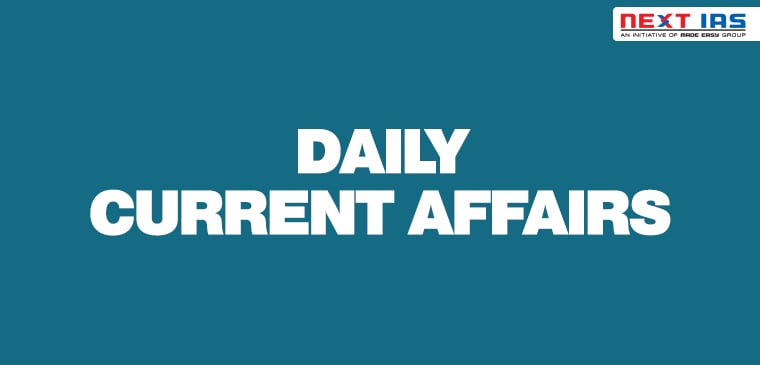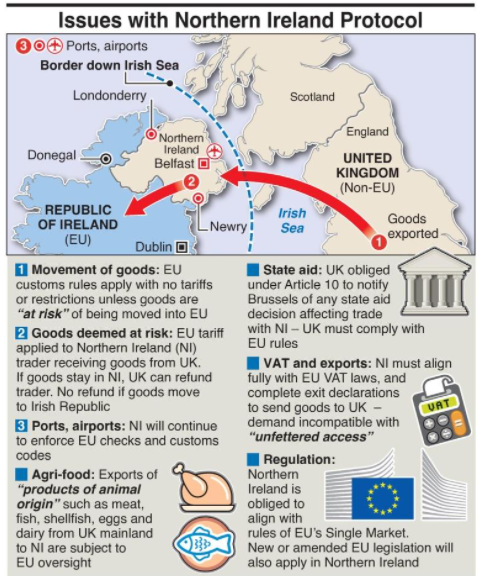
In News
Recently, the United Kingdom (UK) has highlighted the need to renegotiate the Northern Ireland Protocol.
- According to the UK, the protocol has the potential to create so many problems and hence suggested rewriting it or even abandoning it in the absence of renegotiations.
Northern Ireland Protocol
- It aims to resolve the issue of the border between Northern Ireland and the Republic of Ireland.
- Northern Ireland is part of the UK and the Republic of Ireland remains part of the European Union (EU).
- It has been one of the major issues created by Brexit.
- This frontier is contested and parts of it were fortified during the decades of violence known as “The Troubles”.
- With the Good Friday Agreement those visible signs of division melted away along the open border, however, it has again come into a troubled position with Brexit.
- The Good Friday Agreement, also known as Belfast Agreement, was reached on Good Friday, 10th April 1998.
- It was an agreement between the British and Irish governments and most of the political parties in Northern Ireland, on how Northern Ireland should be governed.
- Under Brexit, the UK Prime Minister insisted on leaving Europe’s customs union and its single market, allowing goods to flow freely across European borders without checks.
- The Good Friday Agreement, also known as Belfast Agreement, was reached on Good Friday, 10th April 1998.
- The protocol sets out a plan to deal with this unique situation by effectively leaving Northern Ireland half inside the European system and half inside the British one.

(Image Courtesy: DT)
Current Issue of Contention
- Under the protocol, foods with animal origins coming from mainland Britain into Northern Ireland need health certification.
- This has been done to ensure that the food items meet European standards as they would end up in Ireland, part of the EU’s single market.
- The UK wants a light-touch system (with minimal checks) on goods that companies promise will stay in Northern Ireland.
- On the other hand, the EU wants Britain to sign up to Europe’s health certification rules to minimize the need for controls.
- Regulations like this have been waived during the ongoing “grace period”, which is scheduled to end later in 2021.
Concerns
- The plan means more checks on goods entering Northern Ireland from mainland Britain, effectively creating a border down the Irish Sea and dividing the UK.
- Brexit has led to creation of the new bureaucracy and some companies have stopped supplying stores in Northern Ireland saying that they cannot deal with the added paperwork.
- Dividing the territory between the nation and the bloc has enraged conservative lawmakers and unionists. It has inflamed the sentiment of people of Northern Ireland who want the region to remain part of the UK and identify as British. They believe the changes could threaten their identity and future in the UK.
- The renegotiation is risky because ultimately Britain has no real alternative to the protocol short of ripping it up and daring the Republic of Ireland to resurrect the Irish border.
- Although the UK has an option to deploy an emergency clause known as Article 16 that will permit it to act unilaterally, effectively allowing it to suspend parts of the protocol.
- However, that could inflame sectarian tensions in Northern Ireland, provoke a trade war with Brussels and heighten tension with the US administration.
- The US President Joe Biden, with Irish heritage, has warned the UK not to do anything to undermine the Good Friday Agreement.
- A drooped protocol would not be an ideal backdrop for the UN Climate Change Conference, which will need international allies, to be hosted by the UK PM in Glasgow, Scotland, later in 2021.
EU’s Stand
- The EU is adamant of following the protocol as it has been signed and negotiated by none other than the UK’s PM himself who pushed it through the British Parliament. It does not understand the sudden change in his stand now.
- British critics accuse the EU of being overly rigorous and legalistic in their interpretation of the protocol.
- EU leaders believe that the bloc’s existential interests are being put at risk.
- The single market is one of the cornerstones of the EU and if it is undermined, it could threaten the building blocks of European integration.
Reactions on Renegotiation Proposal
- The European Commission, the EU’ s executive body, said it would seek creative solutions but would not renegotiate the deal.
- The UK PM has been criticised for his lack of trustworthiness, willingness to break international commitments and denial of responsibility.
- On the other hand, the EU has been accused of inflexibility in applying rules, lack of sensitivity to feelings in parts of Northern Ireland and vengeful hostility toward Britain for exiting the bloc.
Way Forward
- The current situation can be seen as an effort for negotiating and the best outcome for the UK would be winning concessions on the protocol from Brussels.
- During the Brexit talks, the UK relied on a so-called madman strategy and threatened to quit the bloc without any deal at all.
|
European Union
Brexit
(Image Courtesy: HSF) |
Source: IE
Previous article
Amendment in IBBI Regulations 2016
Next article
Facts in News